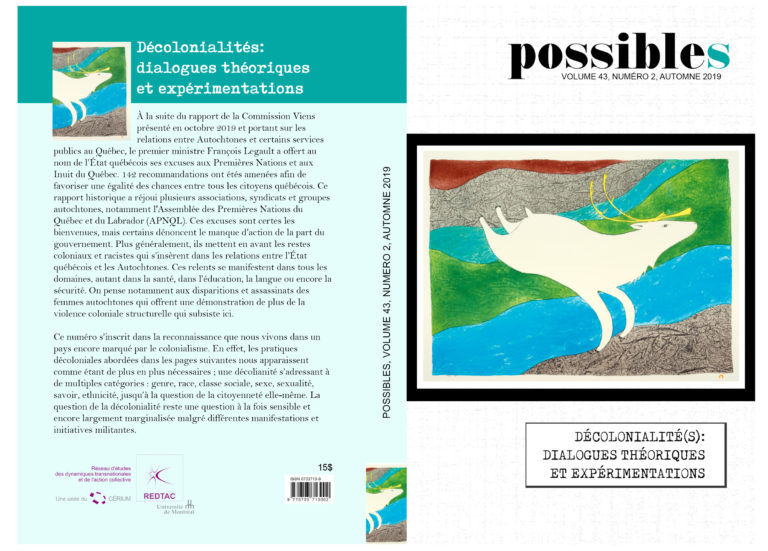Références
Alfred, G. T. (2009). Colonialism and State Dependency. Journal of Aboriginal Health, 1, 42–60. Consulté sur http://www.naho.ca/jah/english/jah05_02/V5_I2_Colonialism_02.pdf.
Burnett, K., Hay. T., & Chambers, L. (2016). Settler Colonialism, Indigenous Peoples and Food: Federal Indian policies and nutrition programs in the Canadian North since 1943. Journal of Colonialism and Colonial History, 12(2). https://doi:10.1353/cch.2016.0030
Carter, S. (1990). Lost harvests: Prairie Indian reserve farmers and government policy. Montreal: McGill-Queen’s University Press.
Chaifetz, A., & Jagger, P. (2014). 40 Years of dialogue on food sovereignty: A review and a look ahead. Global Food Security, 3(2), 85–91. https://doi.org/10.1016/j.gfs.2014.04.002
Clapp, J. (2016). Food. Cambridge, England: Polity Press.
Daschuk, J. W. (2014). Clearing the Plains. Regina: University of Regina Press.
Desmarais, A. (2015). The gift of food sovereignty. Canadian Food Studies / La Revue Canadienne Des Études Sur l'alimentation, 2(2), 154. https://doi.org/10.15353/cfs-rcea.v2i2.115
Desmarais, A. A., & Wittman, H. (2014). Farmers, foodies and First Nations: getting to food sovereignty in Canada. Journal of Peasant Studies, 41(6), 1153–1173. https://doi.org/10.1080/03066150.2013.876623
Dobyns, Henry. (1966). An Appraisal of Techniques with a New Hemisphere Estimate. Current Anthropology, 7(4), 395-416. Consulté sur http://www.jstor.org.subzero.lib.uoguelph.ca/stable/2740306
Government of Canada. (2019). Canada’s food guide. Consulté sur https://food-guide.canada.ca/en/
Grey, S., & Patel, R. (2015). Food sovereignty as decolonization: some contributions from Indigenous movements to food system and development politics. Agriculture and Human Values, 32(3), 431–444. https://doi.org/10.1007/s10460-014-9548-9
Joseph, B. (2018). 21 Things You May Not Know About the Indian Act. Port Coquitlam: Indigenous Relations Press.
Kelm, M.-E. (1998). Colonizing bodies: Aboriginal health and healing in British Columbia, 1900-50. Vancouver, BC: UBC Press.
Kepkiewicz, L., & Rotz, S. (2018). Settler colonialism and the (im)possibilities of a national food policy. Canadian Food Studies / La Revue Canadienne Des Études Sur l'alimentation, 5(3), 248–258. https://doi.org/10.15353/cfs-rcea.v5i3.275
Kuhnlein, H., Receveur, O., & Chan, L. (2001). Traditional food systems research with Canadian Indigenous Peoples. International Journal of Circumpolar Health, 60(2), 112-122.
Latin American & Iberian Institute, University of New Mexico. (n.d.). The Song "1492": Discussion and Analysis of Lyrics. Consulté sur c/info/k-12-educators/assets/documents/exploration-and-conquest-in-the-americas/the-song-1492.pdf
Leblanc, J., & Burnett, K. (2017). What Happened to Indigenous Food Sovereignty in Northern Ontario? In M. A. Robideoux & C. W. Mason (Eds.), A Land Not Forgotten: Indigenous Food Security & Land-Based Practices in Northern Ontario (pp. 16–33). Winnipeg: University of Manitoba Press.
Leopold, Aldo. (1949). A Sand County almanac, and sketches here and there. New York: Oxford University Press.
Matties, Z. (2016). Unsettling Settler Food Movements: Food Sovereignty and Decolonization in Canada. Cuizine, 7(2). doi:10.7202/1038478ar
Morrison, D. (2011). Indigenous Food Sovereignty. In H. Wittman, A. A. Desmarais, & N. Wiebe (Eds.), Food Sovereignty in Canada: creating just and sustainable food systems (pp. 97–113). Winnipeg & Black Point: Fernwood Publishing.
Mosby, I., & Galloway, T. (2017). 'The abiding condition was hunger': assessing the long-term biological and health effects of malnutrition and hunger in Canada's residential schools. British Journal of Canadian Studies, 30(2), 147–162. https://doi.org/10.3828/bjcs.2017.9
Mundel, E. (2008). Story-gathering with the Urban Aboriginal Community Kitchen Garden Project (Master's thesis). Consulté sur https://circle.ubc.ca/handle/2429/2527
Mundel, E., & Chapman, G. E. (2010). A decolonizing approach to health promotion in Canada: The case of the Urban Aboriginal Community kitchen garden project. Health Promotion International, 25(2), 166–173. https://doi.org/10.1093/heapro/daq016
Nutton, J., & Fast, E. (2015). Historical trauma, substance use, and indigenous peoples: Seven generations of harm from a "big event." Substance Use and Misuse, 50(7), 839–847. https://doi.org/10.3109/10826084.2015.1018755
PFPP (People's Food Policy Project). (2010). First principles protocol for building cross-cultural relationships [online]. Consulté sur: foodsecurecanada.org/sites/foodsecurecanada.org/fi les/First_Principles_July_2010.pdf
Power, E. M. (2008). Conceptualizing food security for aboriginal people in Canada. Canadian Journal of Public Health, 99(2), 95–97. https://doi.org/10.1016/j.gloenvcha.2007.09.002
Rose, G. (1997). Situating knowledges: Positionality, reflexivities and other tactics. Progress in Human Geography, 21(3), 305-320. https://doi.org/10.1191/030913297673302122
Rotz, S. (2017). 'They took our beads, it was a fair trade, get over it': Settler colonial logics, racial hierarchies and material dominance in Canadian agriculture. Geoforum, 82(February), 158–169. https://doi.org/10.1016/j.geoforum.2017.04.010
R. v. Sparrow, [1990] 1 S.C.R. 1075
Tsilhqot'in Nation v. British Columbia, 2014 SCC 44, [2014] 2 S.C.R. 256
Schwenk, A., & Macallan, D. C. (2000). Tuberculosis, malnutrition and wasting. Current Opinion in Clinical Nutrition and Metabolic Care, 3(4), 285–291. https://doi.org/10.1097/00075197-2000T07000-00008
Smits, D. D. (1994). The frontier army and the destruction of the buffalo: 1865-1883. The Western Historical Quarterly, 25(3), 312–338. https://doi.org/10.2307/971110
Truth and Reconciliation Commission. (2015). Honouring the Truth, Reconciling for the Future: Summary of the Final Report of the Truth and Reconciliation Commission of Canada. Consulté sur http://www.trc.ca/websites/trcinstitution/index.php?p=890
Watt-Cloutier, S. (2015). The Right to Be Cold. Toronto: Penguin Canada Books.
Wiebe, N., & Wipf, K. (2011). Nurturing Food Sovereignty in Canada. In H. Wittman, A. A. Desmarais, & N. Wiebe (Eds.), Food Sovereignty in Canada: creating just and sustainable food systems (pp. 1–19). Winnipeg: Fernwood Publishing.
Windfuhr, M., & Jonsén, J. (2005). Food sovereignty: towards democracy in localized food systems. Practical Action Working Paper. https://doi.org/10.3362/9781780441160
Wittman, H. (2015). From protest to policy: The challenges of institutionalizing food sovereignty. Canadian Food Studies / La Revue Canadienne Des Études Sur l'alimentation, 2(2), 174. https://doi.org/10.15353/cfs-rcea.v2i2.99
Wolfe, P. (2012). Settler Colonialism and the Elimination of the Native. Settler Colonial Studies, 2(1), 226–252. https://doi.org/10.1080/2201473X.2012.10648834

